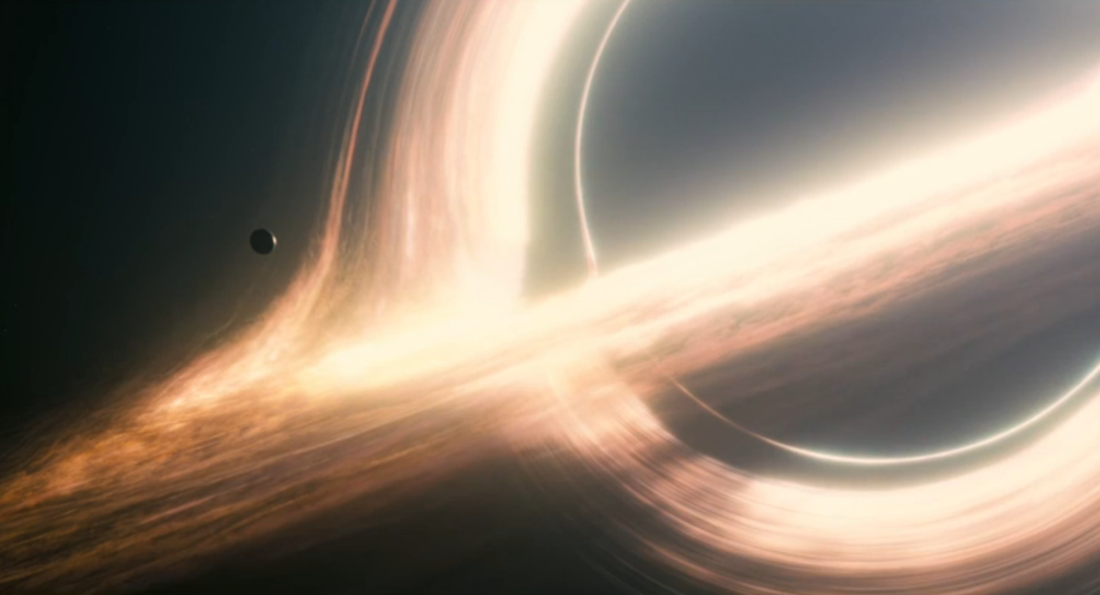Cooper (Matthew McConaughey) was once a NASA pilot, back when NASA still flew missions. That was before the famines, the blights, and the endless dust storms. The world no longer needs astronauts or spaceships: it needs food, and all the world’s resources are devoted solely to growing enough for everyone to eat. Cooper never thought he would fly again, until a mysterious gravitational anomaly in his daughter’s bedroom leads him to a secret underground base housing a clandestine project: a manned space expedition. Not just any expedition, but an expedition through a newly discovered wormhole near Saturn leading to a cluster of planets in a far-off galaxy. It is hoped that one of these worlds could be humanity’s new home to replace the dying Earth. The catch for Cooper is that the trip will take many years, forcing him to leave his family behind. The voyage is one of monumental courage, crossing vast distances of time and space. But tying everything together across the dimensions is the love between Cooper and his daughter, Murph.
Christopher Nolan, best known for films such as Inception, The Prestige, and The Dark Knight Saga, directed Interstellar. It features an all-star cast, including the aforementioned Matthew McConaughey, Jessica Chastain as Murph, Anne Hathaway, David Gyasi, Wes Bentley, Matt Damon, the voices of Bill Irwin and Josh Stewart, and Nolan’s longtime collaborator Michael Caine. The acting is universally spot on, with nary a sour note through the whole run time. Even though the writing has the occasional rough spot, the phenomenal quantity of talent from the cast negates any bad taste from that. Everyone in the film shines, in all 169 minutes of it. While I do admit that it is maybe a tad bit longer than it had to be (although time is suitably an integral theme of the film), I can honestly say I was never once bored, tired, or impatient. Unlike 2001: A Space Odyssey (its most obvious inspiration), Interstellar moves along at a brisk pace, keeping the audience engaged for the entirety of its run. Also unlike Stanley Kubrick’s classic, Interstellar is thoroughly comprehensible; you will not leave the theatre shaking your heads in confusion. In fact, for a Christopher Nolan film, it was surprisingly straight-forward, with little in the way of plot twists.
The special effects are exceedingly impressive. Between the starships, planets with solid clouds and mountain-sized waves, and starlight bending around the event horizon of a black hole, Interstellar is probably the best looking film all year. I am expecting it to sweep the relevant categories (Best Visual Effects, Best Cinematography, Best Art Direction) at the Academy Awards. The special effects enhance the vastness and strangeness of space, which comes across so well in the film. As for sound, let’s just say that the speakers blare about as loud as an actual rocket engine. There were times when I had some difficulty making out dialogue over the wonderful cacophony, which I believe is due to the sheer volume on display. Despite that though, this is a film that needs to be seen on an IMAX screen in order to get the full experience of scale which is so important to this film.
The other movie it will inevitably be compared to is Gravity, being the other modern film on a huge scale which breaks out of the usual sci-fi ghetto superb science fiction films are frequently confined to. However, it’s comparing apples to oranges, as they are totally different kinds of films. Gravity was a film that used space and scale to create tension and suspense, always keeping you on the edge of your seat. In that sense, it’s really more of a thriller film than sci-fi, despite the cosmic set dressing. Interstellar, by contrast, is a film firmly rooted in the science fiction tradition. It is a story about big ideas, hopes, and dreams. It uses space and scale to inspire us. While watching this film, I was reminded of the way I felt when I first watched Star Wars and 2001. It reminded me of the vastness of the space between stars, the enormity of time, and our tiny place within all of it. It made me remember of how wonderful it is to dream about the stars.
In the end, Christopher Nolan’s Interstellar is a film on a cosmic scale. It is a film that you cannot help but watch and be awed by. Is it perfect? No; it’s slightly too long, the writing could be a tad bit better, and sometimes you can’t hear characters speak over the roar of rocket engines. But it is the first film in a long while that made me recall those grand ideas and feelings. For that reason, Interstellar is one of the best films of the year. Because every once in a while, we need to be reminded of how small we really are.
Grade: A

 RSS Feed
RSS Feed
